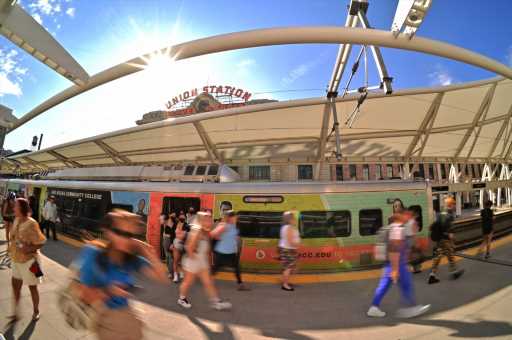
Worsening perceptions from RTD riders and metro Denver residents about the cost of transit fares, service reliability and frequency, and their personal safety on the system hurt the agency’s ratings in its latest annual surveys — and those were among factors in a Tuesday board vote that cost its CEO a performance raise.
More than two years of pandemic service cuts, continuing staffing shortages, and recent spikes in drug use and crime have taken their toll on the Regional Transportation District’s reputation, according to customer and community surveys commissioned by the agency and released last month. In the customer survey, the percentage of bus riders who reported being satisfied with service declined from 81% in 2021 to 67% this fall; satisfaction among train riders dropped from 85% to 67%.
Debra Johnson, who was hired to lead the Regional Transportation District in late 2020, has drawn strong praise from its 15-member elected board for steps she’s taken to tackle its wide-ranging, difficult challenges. Her current pay is nearly $375,000.
But the declining ratings in surveys by BBC Research & Consulting affected her annual performance appraisal nonetheless. That is because the agreed-upon performance criteria set out in her contract includes 5% improvements in overall customer and community survey ratings, with that and other data making up 50% of her overall performance.
In the surveys, RTD missed the mark — wildly.
The targeted survey ratings measure the difference between the share of respondents who recommend RTD highly and those who rate it much lower. In the new customer survey of more than 1,000 riders, some of RTD’s net ratings fell by up to 75%, while still coming out positive overall.
The community survey gauged perceptions of RTD more widely from 600 district residents, regardless of whether they use RTD services. Their recommendation ratings came out slightly negative in 2021 and fell even more deeply underwater in the new survey.
While the board gave Johnson high marks on the other half of her evaluation, which included subjective criteria, its members opted, with her backing, to give no performance raise.
In part, they recognized that Johnson just received a large cost-of-living adjustment last month — by 7.7% — to account for high inflation this year. That annual COLA increase is required under her contract to match the change in the consumer price index, and it raised her salary to $374,877. (On Tuesday, RTD’s non-union salaried employees were told they’d receive a 1.5% COLA increase this month.)
Johnson has received other pay bumps. A year ago, she was given a 6% performance raise. All told, including an earlier COLA increase, her starting salary of $315,000 in November 2020 has grown by 19% in just over two years.
According to a recent compensation analysis performed by an outside firm, Johnson’s salary is now just 3% below the market average for U.S. transit agencies, making it competitive.
Director Bobby Dishell, the vice chair of the performance committee, said in an interview that the board was “being good stewards of public funds” by leaving her salary at the same level for now.
Several board members spoke up in Johnson’s favor Tuesday night before the unanimous vote to approve the no-raise appraisal.
“The evaluation is in no way indicative of the work that our general manager has done during this pandemic, during the financial crisis — I mean, all of the things, with the security and the issues at Union Station with our homeless population,” said Director Shontel Lewis, who chairs the performance committee.
She credited Johnson for helping to address the Union Station problems, including by hiring an outreach coordinator to work with homeless people.
Read a presentation about the RTD survey results:
Source: Read Full Article